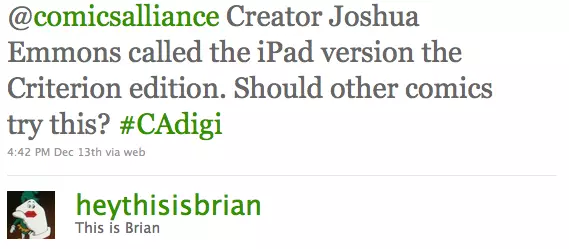
Digital December: 7 Things YOU Want to See in Digital Comics

Over the past two weeks, we've interviewed several representatives from six companies as part of our Digital December. Marvel and DC Comics are the Big Two, while Dark Horse, Boom! Studios, and IDW have turned a mix of licensed and original content into successful publishing ventures, and Fantagraphics is one of the industry's foremost publishers of literary comics. Together, they provided a pretty good cross-section of the modern comics industry and a picture of where digital comics are going.
That's all well and good, but what do YOU have to say? We asked ComicsAlliance readers on Facebook and Twitter what they wanted from the future of digital comics, and the seven primary categories of your responses, wishes, and requests are listed after the jump, along with a bit of commentary and analysis from yours truly.
1. Make digital comics as appealing as pirated books


(Thanks to @colthoskins and @cromonthehil!)
Let's start with the biggest elephant in the room: piracy. Whether you're dealing with manga or American comics, piracy is a huge element of digital comics. Manga fans are used to getting their favorite series years ahead of the American release for free, scanned and translated by other fans, and widely available on public websites. American comic books aren't in quite as bad of shape in terms of acceptance of piracy, but pretty much any comic you want is just a short Google search away. It sucks, but it's true, and it will remain true until the day after forever. So, what do you do?
The comics industry is going to have to make digital comics more appealing than pirated books. This is largely going to be a function of convenience and price point. They're going to have to make digital comics available everywhere and at any time you might conceivably buy them. Comic shops are limited in terms of stock, location, and hours. Ordering your comics online tends to solve most stock problems, but in exchange, you have to wait a couple of days for your books.
So far, digital comics are doing just okay in terms of battling piracy. You can buy digital books on a bunch of platforms, from Sony's PlayStation Portable to iPad to mobile phones, and the stores never close. The libraries aren't quite as in-depth as they should be, but ComiXology in particular adds over one hundred new comics a week. For being roughly a year old, the currently available library of digital comics is in pretty good shape.
Price-wise, digital comics have yet to find their level. Marvel has seen success with four dollar digital comics, something that will undoubtedly come back to bite us in the long run, and the baseline price for most of the books is hovering around $1.99. Dark Horse has promised us $1.49 comics, which is much more reasonable, and some companies have managed to make $0.99 work for them.
Pull lists are a vital part of the comic shop ecosystem. You talk to your shop owner, request certain comics in advance, and you're guaranteed a copy on release date. Subscriptions don't really exist for digital books right now. You can't set up a pull list, and if you want to follow a series, perhaps David Hine and Shaky Kane's Bulletproof Coffin, which has been sporadically updated over the past few months, you need to follow the RSS feed to keep up, or pore through the releases in the app or on the website every week. It's a hurdle that could prove discouraging, especially for newer and more casual readers. A subscription system, where pre-selected series are automatically purchased and delivered to your device of choice, would definitely make a difference in terms of convenience. As far as price goes, buying in bulk should result in a discount, just like buying an album digitally is cheaper than buying a bunch of individual mp3s.
Comic books are a collector-driven industry right now, and that means that ownership matters. If you tire of print comics, you can trade or resell them. You own them outright and can do as you wish. With digital comics, that isn't true. You own a license to view the content, at best, and have no rights beyond that.
While it would be nice to have full ownership of digital comics, I'm not sure if that's at all likely. Licensing agreements are the new hotness as far as purchasing digital content goes, loading the publishing company with benefits and the consumer with restrictions, and it will take a ton of effort to make the companies move on this point. What's important is making sure that the licensing agreements are as attractive to us as they are to the companies. Whether this means unlimited downloading on any platform tied to your email, being able to share your comics, or getting a one-time download of a CBR of the comics you've purchased is unknown, but if consumers don't push for it consistently, it won't happen. Every single publisher we spoke to is licensing their content, not selling it.
The relationship between print comics and digital comics is going to be a tricky one. Digital comics cannot completely replace print comics the way that MP3s have completely replaced CDs for many consumers. The reading experience and aesthetics are too different. Something like Darwyn Cooke's The Outfit, which has been intricately designed to appeal to a certain market, loses that design when transferred to a digital format. Getting both, preferably not at a premium, is a good solution. It's similar to getting a free digital copy of a movie when purchasing a Blu-ray or DVD, but hopefully without a built-in expiration date and hardware-specific viewing.
A kind of symbiosis will likely be the final result. Digital comics will change how print comics are sold, but will not completely supplant them. Dark Horse is going to be releasing short stories for several of their series which will only be purchasable from retail comic shops. This pushes customers into stores, where hopefully they will purchase print comics. Barnes & Noble has seen some success with this type of initiative with their nook e-reader. nook owners can use the wi-fi of a Barnes & Noble to view many of the books in the Nook's catalog, free for up to an hour.
6. Enhanced or added content included for digital comics



It's important that digital comics do things that print comics can't. The convenience and price are a selling point, but things like the panel-by-panel view are good, too. This idea, used in Verum Corpus by Joshua Emmons, Mike Norton, Mark Englert, and Nate Lovett, is a fantastic one.
Print comics can't replicate this sort of experience. At best, they can have a collection of sketches and covers in the back of a trade paperback. With digital books, though, being able to strip away the layers that make up the comic is a definite possibility. Depending on the workload involved, this could be a fantastic selling point for digital books. IDW and Graphic.ly have already begun experimenting with this.
I could see the price being higher than your standard digital books, but the sheer flexibility and variety of content available would justify it. This is something that comics companies should push. Digital comics should be the high definition special edition of print comics. Not everyone will buy in, but those that do will sing its praises. Pay attention, companies: I bet there's a market out there just waiting to be satisfied. Learn from DVDs.
You know what sucks about comics, and all print media, really? When you want something that's out of print. Whether it's Grant Morrison and Frank Quitely's Frank Mentallo or a complete collection of Secret Defenders from the '90s (why do you want that?), if you want it, you're going to have to dig for it, and probably pay a premium, too. Digital comics don't have that limitation. Once it's made available, it's available forever. Or rather, it should be.
Regardless, almost every company has books that you can't get or are not shipped to every single store. Digital comics are a chance to rectify that, and should be embraced to that effect. Low-selling series books from mainstream publishers and indie books should, as a general rule, be available online. It may not be able to stave off cancellation, but there are people who want these books who simply cannot get to them through traditional means. Make them available.
Make Moebius, Milo Manara, and Jodorowsky's comics available digitally, too. The odds are good that someone will buy them.
We're done with the first year of digital comics. Companies are beginning to get their sea legs, and the choices they make now will decide the future of digital books. At the same time, the choices we make as consumers will show companies what we want and what we're willing to put up with. It is vitally important that we make sure our voices are heard.
If you have other thoughts or concerns about digital comics, add your two cents in the comments.
More From ComicsAlliance



![Digital December: IDW Launches Digital Graphic Novels on the iTunes App Store [Exclusive]](http://townsquare.media/site/622/files/2010/12/idwbloomcountytop.jpg?w=980&q=75)
















